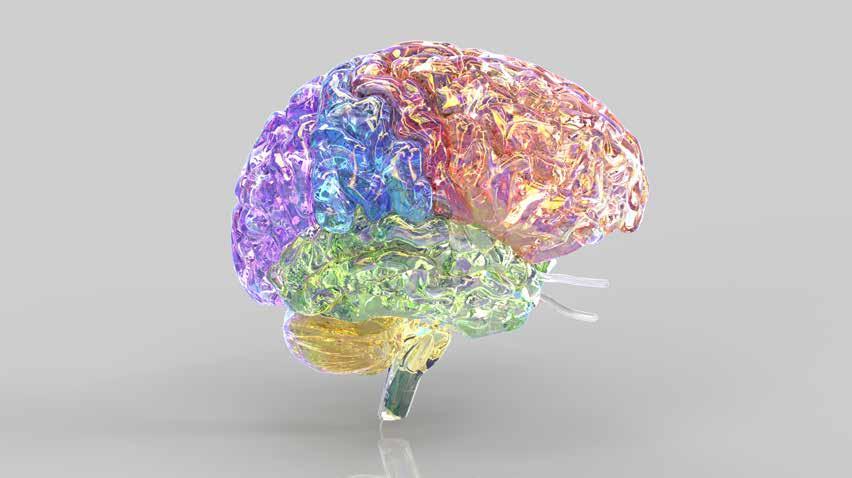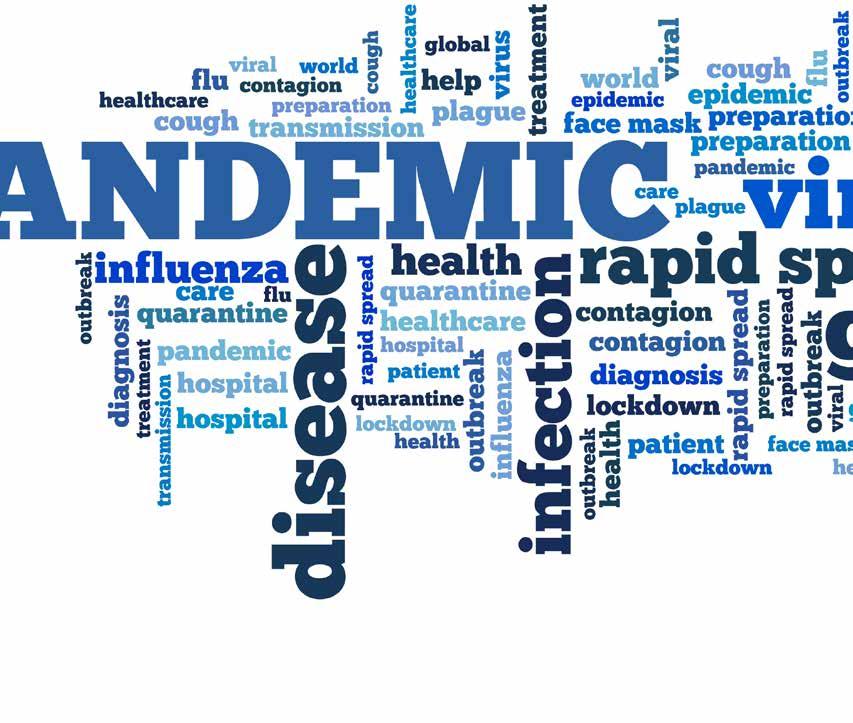
8 minute read
LECOM Professor Finds Gems in Brain Research
Within one’s reach sits a gem of knowledge, waiting to be discovered. The passion to pursue these gems guides the mission of countless medical professionals who devote themselves to a life of formalized inquiry. Time, talent, and training burnish the profoundly purposed pursuit of discovery.
With that discovery in mind, and once again placing itself in the forefront of meaningful endeavors, LECOM is honing its research sector.
Chief among the noteworthy team of researchers at the Lake Erie College of Osteopathic Medicine (LECOM) is Bertalan Dudas, MD, Assistant Dean of Research and Scholarship, Institutional Director of Research, and Director of the Neuroendocrine Organization Laboratory (NEO).
Dr. Dudas is unremitting in his probative studies of the human brain. For more than a decade, the renowned researcher has been producing high-value articles published in well-respected medical journals concerning his innovative and inceptive findings.
The articles are a result of his extensive research and exploration at the Laboratory of Neuroendocrine Organization, a research center of which Dr. Dudas is founder and director. The innovative research hub focuses upon studies of the hormone producing systems of the human brain. Studies at NEO have analyzed the way in which stress affects reproduction and growth; and have produced work centering upon advancing the understanding of Alzheimer’s disease.
Venerated peer-reviewed journals including Neurobiology of Aging and Neurobiology of Disease have published Dudas’ articles based upon his comprehensive studies dealing with several new neuroprotective compounds that appear to protect against lesions of Alzheimer’s Disease.
Numerous other research papers based upon results at NEO have been published in top neuroendocrine journals.
Dr. Dudas received his MD degree at Albert Szent-Györgyi Medical University, Szeged, Hungary in 1993. He obtained his PhD in Neuroscience (summa cum laude) at the University of Szeged in 2007 – the same university where Albert Szent-Györgyi worked when he received his Nobel Prize for his studies involving the roles of vitamin C. Dr. Dudas has worked with LECOM since 2003, and in addition to his key role in LECOM research, he also serves as Professor of Anatomy. During the past five years, Dr. Dudas has published several books on the topic of human neuroendocrinology. One of these volumes entitled, The Human Hypothalamus: Anatomy, Functions and Disorders, published by NOVA Scientific Inc., is a comprehensive work that analyzes a particularly important part of the brain involved in the regulation of almost all of the functions and processes that are crucial for the survival of the individual. Currently, Dr. Dudas is furthering his studies of the human hypothalamus and putting forth his most recent work, a color atlas that will be issued by the noted publisher, Elsevier.
Dr. Dudas is a consummate professional and his passion about his work is palpable. Dr. Dudas echoes the view of the LECOM leadership who understands that such research can have far-reaching positive implications for public health.
“The LECOM administration is extremely supportive of all of my work at NEO,” stated Dr. Dudas, “and they are continually seeking to advance scholarly investigation into innovative areas of research.”
LECOM is delighted to recognize Dr. Bertalan Dudas and his assiduous efforts in a field that will transform and deepen the understanding of the human brain.
The Masked Crusaders Vanquishing the Virus
The unprecedented and challenging events thrust upon America and the world have not been seen since the World Wars.
Then as now, doctors, nurses, and medics were on the front lines saving lives.
For more than a quarter century, the Lake Erie College of Osteopathic Medicine (LECOM) has been training superlative doctors and healthcare professionals.
In support of the Erie community and during the height of the pandemic, the LECOM Institute for Successful Aging opened a dedicated unit to respond to the Coronavirus (COVID-19) Pandemic. The Command Center coordinated needs, both for employees and patients, including community preparedness and communication, staff management, supply inventory, facility readiness, finance, and public education.
The dedicated unit remains able to accommodate a surge of postacute care patients from partnering hospitals.
The stand-alone wing offers a separate entrance for new admissions. It also houses a screening station with a thermal-imaging camera to check the temperature of new patients and staff. In addition, there is a station supplied with personal protective equipment for staff to don before they enter the unit.

The 10-room unit can accommodate up to 14 patients and as many as 20, if necessary. A new air-handling system produces negative pressure in two rooms to ensure safeguards regarding disease transmission.
In addition to the meaningful efforts exhibited by the LECOM Institute for Successful Aging, LECOM leadership fully engaged in the battle.
John M. Ferretti, DO, LECOM President and CEO, joined with community partners in an effort that began at Gannon University to create critical face shields to protect local doctors and nurses who treat patients with the Coronavirus. He donated $5,000 to the face shield project. The Gannon University engineering lab used 3D printers to craft plastic face shields, an apparatus shown to be a very useful piece of Personal Protection Equipment (PPE). Shields provide critical protection for health care professionals, safeguarding the eyes and face from possible virus exposure.
The funds were earmarked to create masks for every possible health care provider in Erie County and in surrounding counties.
LECOM affiliated physicians committed themselves fully to the fight as well. Seth Carter, DO, and Anthony Ruffa, DO, participated in community call-in phone-bank programs. They, along with physicians from two other Erie hospitals answered questions from a concerned
community. The program entitled, Ask the Expert was facilitated by Erie News Now (WICU/WSEE).
Dotting the map in urban centers and rural towns across the nation, LECOM alumni and residents were actively engaged in the throes of the health crisis caused by the virus. One such graduate, Melodie Miller Chludzinski, DO, MHSA is an urgent care physician. Dr. Chludzinski was graduated from the College of Osteopathic Medicine in 2002; and she returned to LECOM for her Masters in Health Service Administration, earning her degree in 2017. Her typical work schedule involves ten 12-hour shifts each month, but during the height of the pandemic, she added a further ten shifts within the same month. Away from her family for multiple weeks at a time, her husband cared for home and hearth, working full time and caring for the couple’s 13-year old son and their college-age daughter. Pressing concerns wrought by the highly communicable viral contagion separated the family as Dr. Chludzinski sought to protect her loved ones by staying away from them. “I never imagined that I would feel such a strong need to be away from my family to be of help for my occupation,” noted the dedicated physician.
As LECOM alumni and residents served in the arena of battle, social media was teeming with tweets and videos depicting scenes of dedication from overloaded hospitals. The world of social media was constantly energized throughout the whole of the crisis, during which time LECOM participated in multiple live-stream events in conjunction with the Jefferson Education Society. Each of the 45-minute programs featured a panel of LECOM Health experts who discussed the latest updates on the pandemic and who answered questions directed to them from the anxious public. The forums were broadcast on Facebook.
As notes of encouragement and gratitude flowed to the medical world, many of the posts on social media included photos of exhausted doctors, nurses, and hospital staff – many of their faces, bruised and marked from hours of wearing tight-fitting masks. Other posts depicted workers dressed head-to-toe in protective gear huddled together, sleeping in hallways. Physicians and healthcare professionals spent countless hours on the front lines saving lives, healing, and serving their fellow man.
It is a truism that transformative moments call people to find their better angels, and those people have the power to change lives. Throughout LECOM history, its people have committed themselves to community, and in times of challenge they have stood together, proclaiming a proud heritage and securing the future.
LECOM scholars eagerly sought out ways to assist in the battle. Collaborating with medical students from the University of Pittsburgh School of Medicine, a group of LECOM students joined forces to support the frontline healthcare workers.
The collaborative worked to offer support to the families of those in healthcare, addressing their very real needs, from undertaking child care, to food and medication delivery, to contact tracing through the county health department. The dedicated medical students applied their skills to care for others during wholly unprecedented times. Providing essential child care services to the healthcare community became the primary focus of the group. Other initiatives included delivering critical medications and needed resources to community members. The delivery efforts allowed patients to continue receiving their medications during the pandemic thereby reducing their risk of presenting to an emergency room.
The scourge of the Coronavirus and its perfect storm of disruption laid bare the illusion that people can be self-sufficient; instead it found all citizens of almost every nation fragile, disoriented, and mindful of each other's help and comfort.
Chief among those offering help and comfort, providing the succor and life-sustaining support were those men and women of healthcare. Of all of the weapons that they take into battle, none is more powerful than the mind, for it holds their training, instinct, their strength of character, and their commitment to excellence.
Indeed, the imprimatur of achievement does not result from undertaking easy work, rather it results from triumph over difficult tasks that demand one's best.
LECOM has ever sought exceptionalism for the betterment of its students, never forgetting that it is up to our educators, heirs of a glorious past and a heritage of inestimable value, to remain committed to transmitting the lamp of learning to future generations.
The upward course of an institution is due in large measure to the educational excellence and strength of its alumni.
Those within its reach are grateful for the blessing of LECOM, for the length of its life, for the good that it calls its progeny to find. LECOM leadership and educators pledge to do their utmost to preserve and improve it so that in another quarter century, LECOM doctors and healthcare professionals will endure to fight the battles of a new era.
LECOM salutes its alumni and their colleagues as they have worked tirelessly to vanquish this virus.

Mark Samarneh, MD, Nephrology, Adjunct LECOM Faculty










